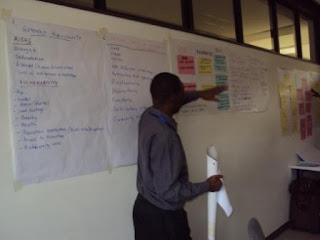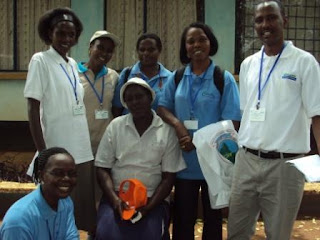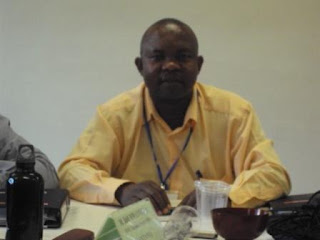Saturday, April 2, 2011
Regional Training Course on Community and EcosystemsBased Climate Change Adaptation
From March 21-25, 2011, the BCRD-Uganda Team Leader Participated in a Regional Training Course on Community and Ecosystems Based Adaptation to Climate Change. The training was held at the AICAD (African Institute for Capacity Development) Headquarters at Jomo Kenyatta University of Agriculture and Technology (JKUAT) in Nairobi, Kenya. Participants came from various institutions (CBOs, NGOs, governments, Local Governments, media houses, parastatals, research centers, universities, technical colleges, secondary schools) in eight African countries namely Uganda, Kenya, Tanzania, Nigeria, Benin, Sierra Leone, Liberia and Senegal.
The focus of the course was to raise awareness on the relevance of ecosystem and community-based approaches for climate change adaptation measures and equip participants with knowledge and tools. By relating theory to practical examples, the course provided understanding and skills to deal with climate change adaptation efforts. The course methodology allowed both for input of experts through lectures, opportunities to digest the content through exercises/brainstorming sessions and a field visit, and extensive exchange of knowledge that participants themselves had actually brought with them to the training venue. The overall objective of the training was to create awareness among participants about the relevance of ecosystems and community-based approaches to climate change adaptation and equip them with the right tools/knowledge to address relevant issues in their work situation.
Course learning objectives
- Participants are aware of the need for community involvement and ecosystem services considerations for when adaptation measures are taken
- Participants know the basic concepts on ecosystems and community-based climate change adaptation, disaster risk reduction and vulnerability
- Participants know a tool for community and landscape-level vulnerability assessment
- Participants know tools for community participation
- Participants know of mechanisms and sources for accessing and distributing climate change adaptation finance.
- Participants have developed an action plan as a tool for implementing ecosystems and community based climate change adaptation.
Participants carried out a field exercise where they interacted with Kenyan Farmers and technocrats at various KARI (Kenya Agricultural Research Institute) centres in the Central District of Mwea. They shared experiences on the various climate change adaptation strategies. Through this exercise, participants learned best practices for possible replication in our home communities. For instance, it was learned from farmers and technocrats that a law has been passed for every household to uproot eucalyptus trees and plant native tree species in at least 10% of each household land. The farmers, KARI researchers and centre directors with whom discussions were held reported that bio gas promotion as well as turning rice straw into briquettes have been embarked on to minimise over reliance on fuel wood energy for cooking and lighting in households. Another lesson from the field is the pertinent issue of Gender. For example, the Kikuyu of Kenya distribute land to women, girls and boys to ensure everyone participates in income generating activities. This was great and our communities especially here in Sub-Saharan Africa would shine if this practice could be adopted in our cultures. Globally, when women thrive, whole communities thrive and everyone is happy.
The course Modules were on:
- Wetlands and ecosystem services for climate change adaptation
- Vulnerability assessment and strategic environmental impact assessments
- Ecosystems-based adaptation and hybrid engineering
- Community-based adaptation approaches
- Disaster Risk reduction in a changing climate
- Innovative financing for adaptation to climate change
- Training skills
The training was highly interactive. The course leader, a lady; three course lecturers, two ladies and a gentleman from the East African Community; and participants that numbered about thirty demonstrated the highest level of cooperation and respect for each other. The ‘new day, new table, new face, new smile’ initiative by the course leader and lecturers was quite an amazing technique in terms of enhancing interaction between participants. By the end of the training, all participants knew each other by name and institution. This was fantastic and on-spot considering that we need to keep in touch to strengthening networking between us as individuals and institutions, share experiences, build synergy and learn about our progress in implementing the action plans among many other issues.
We at BCRD-Uganda are very grateful to AICAD, Wetlands International and JICA for organizing such a relevant training course. We particularly appreciate the pertinent role played by the course facilitators and pledge to share the skills and knowledge acquired widely in a bid to give light to more candles and grow the seed of human energy. At the closing ceremony, one of the guests from CARE International, a lady noted thus: “If we empower people with knowledge, then we have achieved.” Onward we move.
Subscribe to:
Posts (Atom)




































